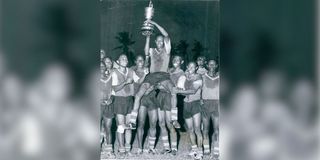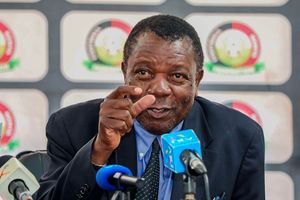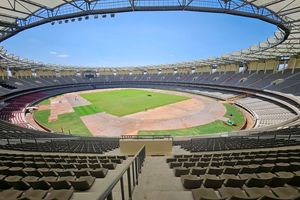
The Kenyan national football team that won the Gossage cup in 1958, 1959 and 1960. Kneeling (second, right) is Joe Kadenge, standing (back, right) is Ambrose Nyapada while Tom Wanjala is standing to the left.
So many jokes, so many sneers
But all those oh-so-nears
Wear you down
Through the years
The stanza above is from a song by Baddiel, Skinner, and Lightning Seed that articulates their self-deprecating humour about England’s national football team’s struggles in major international tournaments.
In between mocking the Three Lions’ failure to add another major international trophy to their solitary 1966 Fifa World Cup triumph, the song also booms with the hope of England, the home of football, ending that silverware drought.
Pre-mature victory song
Through it all in the song, hope and ridicule make unlikely unions in the bop’s satirical refrain – it’s coming home, football’s coming home. That refrain is a chant that accompanies England to major international football tournaments and serves as learning material on English humour when the Three Lions return home trophyless.
The chant is not a pre-mature victory song; it is more of us mocking ourselves for believing that England can actually win a trophy, the English often explain when taunted for suffering elimination from a tournament they had won before it even started.
Amusingly, there is something about Kenya’s history in African football that makes that chant and the opening four lines of this article feel at home in the land where fossils of the Turkana Boy were found in 1984.
That is because despite Nairobi being the cradle of international football in Africa, there is little to write home about Kenya’s appearances at major international football competitions, other than occurrences that invite jokes and sneers.
By holding the record of most Afcon appearances (six) without ever progressing beyond the group stage, Harambee Stars are African football’s champions of never. By nearly hosting 1996 Africa Cup of Nations (Afcon), and 2018 African Nations Championship (Chan), Kenya is African football’s king of almost.
The Gossage Cup
That it is now almost certain Kenya will host 2024 Chan and 2027 Afcon together with its East African neighbours, Tanzania and Uganda, an opportunity has presented itself for Kenya to restore its pride in African football with a championship title that will match its status as the sport’s pioneer on the continent.
The first international football match between two African countries was played at the Nairobi Railway Club on May 1, 1926, between Kenya and Uganda. The match ended 1-1 but Kenya won the replay 2-1 two days later to lift the Gossage Cup, Africa’s oldest football tournament. The Gossage Cup is now known as the Cecafa Senior Challenge Cup, a competition whose annual hosting currently competes with the coming of Jesus Christ in terms of uncertainty.
Tanzania would have been part of that history in 1926 had they not withdrawn. It was perhaps the earliest evidence of the East African Community being the tragicomic union it is now.

Tanganyika skipper Mwanaisseen is raised shoulder high by his team-mates after winning the Gossage Cup in Dar es Saalam in the 1970s.
Still, so rare were matches between African countries then. By the time two other African countries had played against each other – Southern Rhodesia (present day Zimbabwe) vs Northern Rhodesia (present day Zambia) in 1946 – Kenya and Uganda had played each other 20 times.
Other African teams – Egypt and South Africa – that had active national teams then only played against non-African teams, whether home or away.
In fact, despite being the first African team to play an international match when they faced Italy in 1920, Egypt waited until 1932 to play a match on home soil. It was only from 1947 that matches between African countries became more common and 10 years after that, the trio of Egypt, Ethiopia, and Sudan competed in the first edition of the African Cup of Nations held in Sudan.
Even in the years that international football in Africa was just limited to encounters between Kenya and Uganda, Kenya was the undisputed minnow in those contests. Such was Uganda’s dominance in that period that Kenya’s six victories in those 20 matches could easily count as flukes as they were all won by a margin of just one goal. Uganda, on the other hand, won 12 of those 20 matches, of which 11 were by a margin of at least two goals.
Yet, it can be argued that being under British colonial rule limited Kenya’s and Uganda’s ability to have a bigger influence on African football then.
The two countries did not become members of Caf and Fifa until the early 1960s, when their independence was imminent. As such, they could not qualify for the Fifa World Cup, and later Afcon, as they were not yet affiliated to Caf and Fifa.
By contrast, Egypt became a member of Fifa in 1923, a year after attaining independence from the British. They were also one of Caf’s founding members in 1957 together with Ethiopia, Sudan, and South Africa.

President Jomo Kenyatta admires the Gossage Cup won by the Kenyan national team. Holding the trophy (right) is team captain Joe Okeya.
However, despite their founding status, South Africa’s active involvement in African football was delayed until the early 1990s as other Caf members condemned their apartheid policy. Apartheid ended in South Africa in 1994, two years after they were accepted back into Caf.
Kenya’s affiliation to Fifa in 1960 and Caf in 1961 was followed by an endless struggle to reclaim their place in African football. World Cup qualification has remained a dream and the six Afcon appearances have been laced with bittersweet memories.
Hosting 2024 Chan and 2027 Afcon
Attempts to host Afcon and Chan just ended up advertising Kenya’s capability to delegate. South Africa hosted (and won) Afcon on our behalf in 1996. Morocco did the same in 2018 when they were awarded Chan hosting rights after we failed to convince CAF that hosting the tournament on the streets and hotel backyards was a viable idea since we had good roads and hotels but no stadiums.
Kenya did host the All Africa Games in 1987 though. Harambee Stars lost 1-0 to Egypt in the final but only after getting there following a power outage that caused their semifinal match against Malawi to be replayed. Malawi was leading 1-0 at the time of the blackout but Kenya won the replay on penalties to progress to the final, perhaps marking the only time in the country’s history when a power outage proved to be a blessing in disguise.
With the prestige of the All African Games having dwindled over the years, hosting 2024 Chan and 2027 Afcon now stand as grand occasions for Kenya to reset its standing in African football. Whether or not we will need blackouts and replayed matches to win the two tournaments, after so many jokes, sneers, and so-nears, African football will have returned home after a century of roaming the continent.







